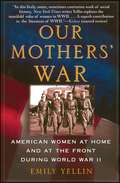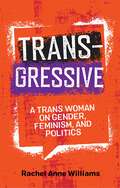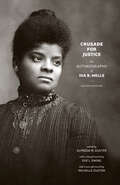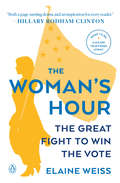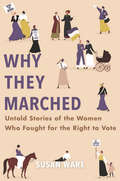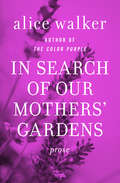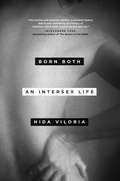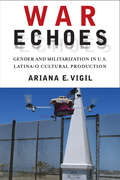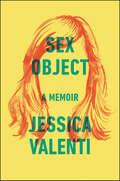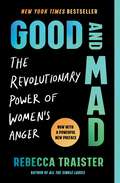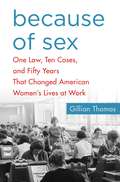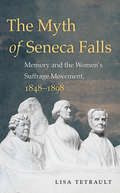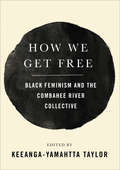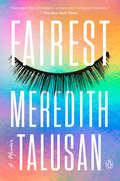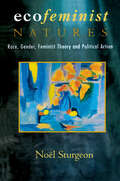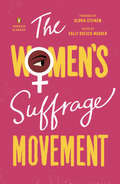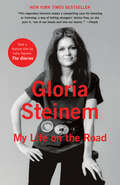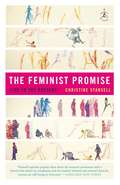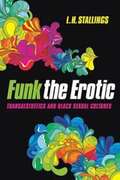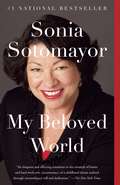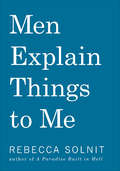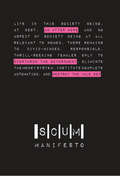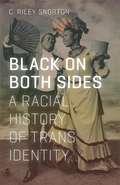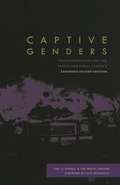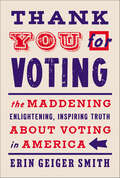Special Collections
NYPL's 2020 Essential Reads on Feminism for Adults
Description: This NYPL list includes first-hand accounts and histories of the suffrage movement that chronicle both its successes and its limitations, as well as contemporary essays on how feminism intersects with race, class, education, and LGBTQ+ activism. #adults
- Table View
- List View
Our Mothers’ War
by Emily YellinRosie the Riveter wasn't the only American woman contributing to the World War II effort; others were spies, nurses, prostitutes, entertainers, pilots, baseball players, politicians, and prisoners of war. After her mother died, author Yellin found a diary and hundreds of letters she'd written while she was a Red Cross nurse in the Pacific. Yellin, a journalist, uses her mother's story as an anchor for a larger narrative which shows that many of the conflicts American society wrestles with today--such a...
Transgressive
by Rachel Anne WilliamsHow do I know I am trans? Is trans feminism real feminism? What is there to say about trans women's male privilege? This collection of insightful, pithy and passionately argued think pieces from a trans-feminist perspective explores issues surrounding gender, feminism and philosophy and challenges misconceptions about trans identities. The book confronts contentious debates in gender studies to alleviate ongoing tension between feminism and trans women. Split into six sections, this collection covers wider issues, as well as autobiographical experiences, designed to stimulate the reader and encourage them to actively participate.
Crusade for Justice
by Ida B. Wells“She fought a lonely and almost single-handed fight, with the single-mindedness of a crusader, long before men or women of any race entered the arena; and the measure of success she achieved goes far beyond the credit she has been given in the history of the country.”—Alfreda M. Duster
Ida B. Wells is an American icon of truth telling. Born to slaves, she was a pioneer of investigative journalism, a crusader against lynching, and a tireless advocate for suffrage, both for women and for African Americans. She co-founded the NAACP, started the Alpha Suffrage Club in Chicago, and was a leader in the early civil rights movement, working alongside W. E. B. Du Bois, Madam C. J. Walker, Mary Church Terrell, Frederick Douglass, and Susan B. Anthony.
This engaging memoir, originally published 1970, relates Wells’s private life as a mother as well as her public activities as a teacher, lecturer, and journalist in her fight for equality and justice. This updated edition includes a new foreword by Eve L. Ewing, new images, and a new afterword by Ida B. Wells’s great-granddaughter, Michelle Duster.
The Woman's Hour
by Elaine WeissThe nail-biting climax of one of the greatest political battles in American history: the ratification of the constitutional amendment that granted women the right to vote.
Nashville, August 1920. Thirty-five states have ratified the Nineteenth Amendment, twelve have rejected or refused to vote, and one last state is needed. It all comes down to Tennessee, the moment of truth for the suffragists, after a seven-decade crusade.
The opposing forces include politicians with careers at stake, liquor companies, railroad magnates, and a lot of racists who don't want black women voting.
And then there are the "Antis"--women who oppose their own enfranchisement, fearing suffrage will bring about the moral collapse of the nation.
They all converge in a boiling hot summer for a vicious face-off replete with dirty tricks, betrayals and bribes, bigotry, Jack Daniel's, and the Bible.
Following a handful of remarkable women who led their respective forces into battle, along with appearances by Woodrow Wilson, Warren Harding, Frederick Douglass, and Eleanor Roosevelt, The Woman's Hour is an inspiring story of activists winning their own freedom in one of the last campaigns forged in the shadow of the Civil War, and the beginning of the great twentieth-century battles for civil rights.
Why They Marched
by Susan WareLooking beyond the national leadership of the suffrage movement, Susan Ware tells the inspiring story of nineteen dedicated women who carried the banner for the vote into communities across the nation, out of the spotlight, protesting, petitioning, and demonstrating for women’s right to become full citizens.
In Search of Our Mothers' Gardens
by Alice WalkerA collection of early personal and political essays from the Pulitzer Prize–winning author of The Color Purple.Includes a new letter written by the author What is a womanist? Alice Walker sets out to define the concept in this anthology of early essays and other nonfiction pieces. As she outlines it, a womanist is a person who prefers to side with the oppressed: with women, with people of color, with the poor. As a writer, Walker has always taken such people as her primary subjects, and her search for paths toward self-possession and freedom always holds out hope for the transformative power of compassion and love. Whether she&’s taking on nuclear proliferation, the promise and problems of the civil rights movement, or her own creative process, Walker always brings to bear a fearless determination to tell the truth. This ebook features an illustrated biography of Alice Walker including rare photos from the author&’s personal collection.
Born Both
by Hida ViloriaA candid, provocative, and eye-opening memoir of gender identity, self-acceptance, and love from one of the world's foremost intersex activists.
My name is Hida Viloria. I was raised as a girl but discovered at a young age that my body looked different. Having endured an often turbulent home life as a kid, there were many times when I felt scared and alone, especially given my attraction to girls.
But unlike most people in the first world who are born intersex--meaning they have genitals, reproductive organs, hormones, and/or chromosomal patterns that do not fit standard definitions of male or female--I grew up in the body I was born with because my parents did not have my sex characteristics surgically altered at birth.
It wasn't until I was twenty-six and encountered the term intersex in a San Francisco newspaper that I finally had a name for my difference. That's when I began to explore what it means to live in the space between genders--to be both and neither. I tried living as a feminine woman, an androgynous person, and even for a brief period of time as a man. Good friends would not recognize me, and gay men would hit on me. My gender fluidity was exciting, and in many ways freeing--but it could also be isolating.
I had to know if there were other intersex people like me, but when I finally found an intersex community to connect with I was shocked, and then deeply upset, to learn that most of the people I met had been scarred, both physically and psychologically, by infant surgeries and hormone treatments meant to "correct" their bodies.
Realizing that the invisibility of intersex people in society facilitated these practices, I made it my mission to bring an end to it--and became one of the first people to voluntarily come out as intersex at a national and then international level.
Born Both is the story of my lifelong journey toward finding love and embracing my authentic identity in a world that insists on categorizing people into either/or, and of my decades-long fight for human rights and equality for intersex people everywhere.
War Echoes
by Ariana E. VigilWar Echoes examines how Latina/o cultural production has engaged with U.S. militarism in the post-Viet Nam era. Analyzing literature alongside film, memoir, and activism, Ariana E. Vigil highlights the productive interplay among social, political, and cultural movements while exploring Latina/o responses to U.S. intervention in Central America and the Middle East. These responses evolved over the course of the late twentieth and early twenty-first centuries--from support for anti-imperial war, as seen in Alejandro Murguia's Southern Front, to the disavowal of all war articulated in works such as Demetria Martinez's Mother Tongue and Camilo Mejia's Road from Ar Ramadi.
With a focus on how issues of race, class, gender, and sexuality intersect and are impacted by war and militarization, War Echoes illustrates how this country's bellicose foreign policies have played an integral part in shaping U.S. Latina/o culture and identity and given rise to the creation of works that recognize how militarized violence and values, such as patriarchy, hierarchy, and obedience, are both enacted in domestic spheres and propagated abroad.
Sex Object
by Jessica ValentiNew York Times Bestseller - An NPR Best Book of the Year“Sharp and prescient… The appeal of Valenti’s memoir lies in her ability to trace objectification through her own life, and to trace what was for a long time her own obliviousness to it…Sex Object is an antidote to the fun and flirty feminism of selfies and self-help.” — New RepublicAuthor and Guardian US columnist Jessica Valenti has been leading the national conversation on gender and politics for over a decade. Now, in a darkly funny and bracing memoir, Valenti explores the toll that sexism takes from the every day to the existential. Sex Object explores the painful, funny, embarrassing, and sometimes illegal moments that shaped Valenti’s adolescence and young adulthood in New York City, revealing a much shakier inner life than the confident persona she has cultivated as one of the most recognizable feminists of her generation. In the tradition of writers like Joan Didion and Mary Karr, this literary memoir is sure to shock those already familiar with Valenti’s work and enthrall those who are just finding it.
Good and Mad
by Rebecca TraisterFrom Rebecca Traister, the New York Times bestselling author of All the Single Ladies comes a vital, incisive exploration into the transformative power of female anger and its ability to transcend into a political movement. In the year 2018, it seems as if women’s anger has suddenly erupted into the public conversation. But long before Pantsuit Nation, before the Women’s March, and before the #MeToo movement, women’s anger was not only politically catalytic—but politically problematic.
The story of female fury and its cultural significance demonstrates the long history of bitter resentment that has enshrouded women’s slow rise to political power in America, as well as the ways that anger is received when it comes from women as opposed to when it comes from men. With eloquence and fervor, Rebecca tracks the history of female anger as political fuel—from suffragettes marching on the White House to office workers vacating their buildings after Clarence Thomas was confirmed to the Supreme Court.
Here Traister explores women’s anger at both men and other women; anger between ideological allies and foes; the varied ways anger is perceived based on its owner; as well as the history of caricaturing and delegitimizing female anger; and the way women’s collective fury has become transformative political fuel—as is most certainly occurring today. She deconstructs society’s (and the media’s) condemnation of female emotion (notably, rage) and the impact of their resulting repercussions.
Highlighting a double standard perpetuated against women by all sexes, and its disastrous, stultifying effect, Traister’s latest is timely and crucial. It offers a glimpse into the galvanizing force of women’s collective anger, which, when harnessed, can change history.
A New York Times Bestseller
Because of Sex
by Gillian ThomasBest known as a monumental achievement of the civil rights movement, the 1964 Civil Rights Act also revolutionized the lives of America's working women. Title VII of the law made it illegal to discriminate "because of sex. " But that simple phrase didn't mean much until ordinary women began using the law to get justice on the job--and some took their fights all the way to the Supreme Court.
Among them were Ida Phillips, denied an assembly line job because she had a preschool-age child; Kim Rawlinson, who fought to become a prison guard--a "man's job"; Mechelle Vinson, who brought a lawsuit for sexual abuse before "sexual harassment" even had a name; Ann Hopkins, denied partnership at a Big Eight accounting firm because the men in charge thought she needed "a course at charm school"; and most recently, Peggy Young, UPS truck driver, forced to take an unpaid leave while pregnant because she asked for a temporary reprieve from heavy lifting.
These unsung heroines' victories, and those of the other women profiled dismantled a "Mad Men" world where women could only hope to play supporting roles; where sexual harassment was "just the way things are"; and where pregnancy meant getting a pink slip. Through first-person accounts and vivid narrative, Because of Sex tells the story of how one law, our highest court, and a few tenacious women changed the American workplace forever.
The Myth of Seneca Falls
by Lisa TetraultThe story of how the women's rights movement began at the Seneca Falls convention of 1848 is a cherished American myth. The standard account credits founders such as Elizabeth Cady Stanton, Susan B. Anthony, and Lucretia Mott with defining and then leading the campaign for women's suffrage. In her provocative new history, Lisa Tetrault demonstrates that Stanton, Anthony, and their peers gradually created and popularized this origins story during the second half of the nineteenth century in response to internal movement dynamics as well as the racial politics of memory after the Civil War. The founding mythology that coalesced in their speeches and writings--most notably Stanton and Anthony's History of Woman Suffrage--provided younger activists with the vital resource of a usable past for the ongoing struggle, and it helped consolidate Stanton and Anthony's leadership against challenges from the grassroots and rival suffragists.
As Tetrault shows, while this mythology has narrowed our understanding of the early efforts to champion women's rights, the myth of Seneca Falls itself became an influential factor in the suffrage movement. And along the way, its authors amassed the first archive of feminism and literally invented the modern discipline of women's history.2015 Mary Jurich Nickliss Prize, Organization of American Historians
How We Get Free
by Keeanga-Yamahtta TaylorBlack feminists remind us “that America’s destiny is inseparable from how it treats [black women] and the nation ignores this truth at its peril” (The New York Review of Books).
Winner of the 2018 Lambda Literary Award for LGBTQ Nonfiction
“If Black women were free, it would mean that everyone else would have to be free.” —Combahee River Collective Statement
The Combahee River Collective, a path-breaking group of radical black feminists, was one of the most important organizations to develop out of the antiracist and women’s liberation movements of the 1960s and 70s. In this collection of essays and interviews edited by activist-scholar Keeanga-Yamahtta Taylor, founding members of the organization and contemporary activists reflect on the legacy of its contributions to Black feminism and its impact on today’s struggles.
“A striking collection that should be immediately added to the Black feminist canon.” —Bitch Media “An essential book for any feminist library.” —Library Journal “As white feminism has gained an increasing amount of coverage, there are still questions as to how black and brown women’s needs are being addressed. This book, through a collection of interviews with prominent black feminists, provides some answers.” —The Independent “For feminists of all kinds, astute scholars, or anyone with a passion for social justice, How We Get Free is an invaluable work.” —Ethnic and Racial Studies Journal
Fairest
by Meredith TalusanA singular, beautifully written coming-of-age memoir of a Filipino boy with albinism whose story travels from an immigrant childhood to Harvard to a gender transition and illuminates the illusions of race, disability, and gender
Fairest is a memoir about a precocious boy with albinism, a "sun child" from a rural Philippine village, who would grow up to become a woman in America.
Coping with the strain of parental neglect and the elusive promise of U.S. citizenship, Talusan found childhood comfort from her devoted grandmother, a grounding force as she was treated by others with special preference or public curiosity. As an immigrant to the United States, Talusan came to be perceived as white. An academic scholarship to Harvard provided access to elite circles of privilege but required Talusan to navigate through the complex spheres of race, class, sexuality, and her place within the gay community. She emerged as an artist and an activist questioning the boundaries of gender.
Talusan realized she did not want to be confined to a prescribed role as a man, and transitioned to become a woman, despite the risk of losing a man she deeply loved. Throughout her journey, Talusan shares poignant and powerful episodes of desirability and love that will remind readers of works such as Call Me By Your Name and Giovanni's Room. Her evocative reflections will shift our own perceptions of love, identity, gender, and the fairness of life.
Ecofeminist Natures
by Noel SturgeonExamining the development of ecofeminism from the 1980s antimilitarist movement to an internationalist ecofeminism in the 1990s, Sturgeon explores the ecofeminist notions of gender, race, and nature. She moves from detailed historical investigations of important manifestations of US ecofeminism to a broad analysis of international environmental politics.
The Women's Suffrage Movement
by Gloria Steinem and Sally Roesch WagnerAn intersectional anthology of works by the known and unknown women that shaped and established the suffrage movement, in time for the 2020 centennial of women's right to vote, with a foreword by Gloria Steinem
Comprised of historical texts spanning two centuries, The Women's Suffrage Movement is a comprehensive and singular volume that covers the major issues and figures involved in the movement, with a distinctive focus on diversity, incorporating race, class, and gender, and illuminating minority voices. In an effort to spotlight the many influential voices that were excluded from the movement, the writings of well-known suffragists such as Elizabeth Cady Stanton and Susan B. Anthony are featured alongside accounts of Native American women who inspired suffragists like Matilda Joslyn Gage to join the movement, as well as African American suffragists such as Sarah Mapps Douglas and Harriet Purvis, who were often left out of the conversation because of their race.
The editor and introducer, Sally Roesch Wagner, is a pre-eminent scholar of the diverse backbone of the women's suffrage movement, the founding director of the Matilda Joslyn Gage Foundation, and serves on the New York State Women's Suffrage Commission.
My Life on the Road
by Gloria SteinemGloria Steinem--writer, activist, organizer, and inspiring leader--now tells a story she has never told before, a candid account of her life as a traveler, a listener, and a catalyst for change.
When people ask me why I still have hope and energy after all these years, I always say: Because I travel. Taking to the road--by which I mean letting the road take you--changed who I thought I was. The road is messy in the way that real life is messy. It leads us out of denial and into reality, out of theory and into practice, out of caution and into action, out of statistics and into stories--in short, out of our heads and into our hearts.
Gloria Steinem had an itinerant childhood. When she was a young girl, her father would pack the family in the car every fall and drive across country searching for adventure and trying to make a living. The seeds were planted: Gloria realized that growing up didn't have to mean settling down. And so began a lifetime of travel, of activism and leadership, of listening to people whose voices and ideas would inspire change and revolution.
My Life on the Road is the moving, funny, and profound story of Gloria's growth and also the growth of a revolutionary movement for equality--and the story of how surprising encounters on the road shaped both.
From her first experience of social activism among women in India to her work as a journalist in the 1960s; from the whirlwind of political campaigns to the founding of Ms. magazine; from the historic 1977 National Women's Conference to her travels through Indian Country--a lifetime spent on the road allowed Gloria to listen and connect deeply with people, to understand that context is everything, and to become part of a movement that would change the world.
In prose that is revealing and rich, Gloria reminds us that living in an open, observant, and "on the road" state of mind can make a difference in how we learn, what we do, and how we understand each other.
The Feminist Promise
by Christine StansellIn this definitive volume, respected historian Christine Stansell tells the story of one of the great democratic movements of our times. She paints richly detailed portraits of well-known leaders--Mary Wollstonecraft, Elizabeth Cady Stanton, Betty Friedan--but others, too, appear in a new light, including Ruth Bader Ginsburg and Toni Morrison. Accounting for the failures of feminism as well as the successes, Stansell notes the emergence in the early 1900s of the dashing "New Woman"; the passing of the Nineteenth Amendment, which granted women the right to vote; the post-World War II collapse of suburban neo-Victorianism; the radical feminism of the 1960s; and the fight for women's rights in developing countries in the era of international feminist movements.
A soaring work, The Feminist Promise is bound to become an authoritative source on this essential subject for decades to come, for the failures of feminism as well as the successes. She notes significant moments in the struggle for gender equality, such as the emergence in the early 1900s of the dashing "New Woman"; the passing of the Nineteenth Amendment, which granted women the right to vote; the post-World War II collapse of suburban neo-Victorianism; and the radical feminism of the 1960s--all of which led to vast changes in American culture and society. The Feminist Promise dramatically updates our understanding of feminism, taking the story through the age of Reagan and into the era of international feminist movements that have swept the globe. Stansell provocatively insists that the fight for women's rights in developing countries "cannot be separated from democracy's survival."
A soaring work unprecedented in scope, historical depth, and literary appeal, The Feminist Promise is bound to become an authoritative source on this essential subject for decades to come on. At once a work of scholarship, political observation, and personal reflection, it is a book that speaks to the demands and challenges--individual, national, and international--of the twenty-first century.
Funk the Erotic
by L. H. StallingsFunk. It is multisensory and multidimensional philosophy used in conjunction with the erotic, eroticism, and black erotica. It is the affect that shapes film, performance, sound, food, technology, drugs, energy, time, and the seeds of revolutionary ideas for black movements. But funk is also an experience to feel, to hear, to touch and taste, and in Funk the Erotic , L. H. Stallings uses funk in all its iterations as an innovation in black studies. Stallings uses funk to highlight the importance of the erotic and eroticism in Black cultural and political movements, debunking "the truth of sex" and its histories. Brandishing funk as a theoretical tool, Stallings argues that Western theories of the erotic fail as universally applicable terms or philosophies, and thus lack utility in discussions of black bodies, subjects, and culture.
In considering the Victorian concept of freak in black funk, Stallings proposes that black artists across all media have fashioned a tradition that embraces the superfreak, sexual guerrilla, sexual magic, mama's porn, black trans narratives, and sex work in a post-human subject position. Their goal: to ensure survival and evolution in a world that exploits black bodies in capitalist endeavors, imperialism, and colonization. Revitalizing and wide-ranging, Funk the Erotic offers a needed examination of black sexual cultures, a discursive evolution of black ideas about eroticism, a critique of work society, a reexamination of love, and an articulation of the body in black movements.
My Beloved World
by Sonia SotomayorThe first Hispanic and third woman appointed to the United States Supreme Court, Sonia Sotomayor has become an instant American icon. Now, with a candor and intimacy never undertaken by a sitting Justice, she recounts her life from a Bronx housing project to the federal bench, a journey that offers an inspiring testament to her own extraordinary determination and the power of believing in oneself. Here is the story of a precarious childhood, with an alcoholic father (who would die when she was nine) and a devoted but overburdened mother, and of the refuge a little girl took from the turmoil at home with her passionately spirited paternal grandmother.
But it was when she was diagnosed with juvenile diabetes that the precocious Sonia recognized she must ultimately depend on herself. She would learn to give herself the insulin shots she needed to survive and soon imagined a path to a different life. With only television characters for her professional role models, and little understanding of what was involved, she determined to become a lawyer, a dream that would sustain her on an unlikely course, from valedictorian of her high school class to the highest honors at Princeton, Yale Law School, the New York County District Attorney's office, private practice, and appointment to the Federal District Court before the age of forty. Along the way we see how she was shaped by her invaluable mentors, a failed marriage, and the modern version of extended family she has created from cherished friends and their children. Through her still-astonished eyes, America's infinite possibilities are envisioned anew in this warm and honest book, destined to become a classic of self-invention and self-discovery.
Men Explain Things to Me
by Rebecca SolnitThe National Book Critics Circle Award–winning author delivers a collection of essays that serve as the perfect &“antidote to mansplaining&” (The Stranger). In her comic, scathing essay &“Men Explain Things to Me,&” Rebecca Solnit took on what often goes wrong in conversations between men and women. She wrote about men who wrongly assume they know things and wrongly assume women don&’t, about why this arises, and how this aspect of the gender wars works, airing some of her own hilariously awful encounters. She ends on a serious note— because the ultimate problem is the silencing of women who have something to say, including those saying things like, &“He&’s trying to kill me!&” This book features that now-classic essay with six perfect complements, including an examination of the great feminist writer Virginia Woolf&’s embrace of mystery, of not knowing, of doubt and ambiguity, a highly original inquiry into marriage equality, and a terrifying survey of the scope of contemporary violence against women. &“In this series of personal but unsentimental essays, Solnit gives succinct shorthand to a familiar female experience that before had gone unarticulated, perhaps even unrecognized.&” —The New York Times &“Essential feminist reading.&” —The New Republic &“This slim book hums with power and wit.&” —Boston Globe &“Solnit tackles big themes of gender and power in these accessible essays. Honest and full of wit, this is an integral read that furthers the conversation on feminism and contemporary society.&” —San Francisco Chronicle &“Essential.&” —Marketplace &“Feminist, frequently funny, unflinchingly honest and often scathing in its conclusions.&” —Salon
SCUM Manifesto
by Valerie SolanasFirst circulated on the streets of Greenwich Village in 1967, the SCUM Manifesto is a searing indictment of patriarchal culture in all its forms.
Shifting fluidly between the worlds of satire and straightforward critique, this no-holds-barred classic is a call to action-a radical feminist vision for a different world. This is an update of the essential AK Press edition, with a new foreword.Valerie Solanas was a radical feminist playwright and social propagandist who was arrested in 1968 after her attempted assassination of Andy Warhol. Deemed a paranoid schizophrenic by the state, Solanas was immortalized in the 1996 film I Shot Andy Warhol.
Black on Both Sides
by C. Riley SnortonWinner of the John Boswell Prize from the American Historical Association 2018 Winner of the William Sanders Scarborough Prize from the Modern Language Association 2018 Winner of an American Library Association Stonewall Honor 2018 Winner of Lambda Literary Award for Transgender Nonfiction 2018 Winner of the Sylvia Rivera Award in Transgender Studies from the Center for Lesbian and Gay Studies The story of Christine Jorgensen, America&’s first prominent transsexual, famously narrated trans embodiment in the postwar era. Her celebrity, however, has obscured other mid-century trans narratives—ones lived by African Americans such as Lucy Hicks Anderson and James McHarris. Their erasure from trans history masks the profound ways race has figured prominently in the construction and representation of transgender subjects. In Black on Both Sides, C. Riley Snorton identifies multiple intersections between blackness and transness from the mid-nineteenth century to present-day anti-black and anti-trans legislation and violence.Drawing on a deep and varied archive of materials—early sexological texts, fugitive slave narratives, Afro-modernist literature, sensationalist journalism, Hollywood films—Snorton attends to how slavery and the production of racialized gender provided the foundations for an understanding of gender as mutable. In tracing the twinned genealogies of blackness and transness, Snorton follows multiple trajectories, from the medical experiments conducted on enslaved black women by J. Marion Sims, the &“father of American gynecology,&” to the negation of blackness that makes transnormativity possible.Revealing instances of personal sovereignty among blacks living in the antebellum North that were mapped in terms of &“cross dressing&” and canonical black literary works that express black men&’s access to the &“female within,&” Black on Both Sides concludes with a reading of the fate of Phillip DeVine, who was murdered alongside Brandon Teena in 1993, a fact omitted from the film Boys Don&’t Cry out of narrative convenience. Reconstructing these theoretical and historical trajectories furthers our imaginative capacities to conceive more livable black and trans worlds.
Captive Genders
by Eric A. Stanley and Nat SmithThe intersection of transgender, gender variant, and queer identity with the crushing force of the Prison Industrial Complex.
Thank You for Voting
by Erin Geiger SmithIn this concise, lively look at the past, present, and future of voting, a journalist examines the long and continuing fight for voting equality, why so few Americans today vote, and innovative ways to educate and motivate them; included are checklists of what to do before election day to prepare to vote and encourage others.Voting is a prized American right and a topic of debate from the earliest days of the country. Yet in the 2016 presidential election, about 40 percent of Americans—and half of the country’s young adults—didn’t vote. Why do so many Americans choose not to vote, and what can we do about it? The problem, Erin Geiger Smith contends, is a lack of understanding about our electoral system and a need to make voting more accessible. Thank You for Voting is her eye-opening look at the voting process, starting with the Framers’ perspective, through the Equal Protection amendment and the Voting Rights Act, to the present and simple actions individuals can take to increase civic participation in local, state, and national elections.Geiger Smith expands our knowledge about our democracy—including women’s long fight to win the vote, attempts to suppress newly enfranchised voters' impact, state prohibitions against felons voting, charges of voter fraud and voter suppression, and other vital issues. In a conversational tone, she explains topics that can confuse even the most informed voters: polling, news literacy, gerrymandering and the Electoral College. She also explores how age, race, and socioeconomic factors influence turnout.Ultimately, Thank You for Voting offers hope. Geiger Smith challenges corporations to promote voting, and offers examples of how companies like Patagonia and Walmart have taken up the task in a non-partisan way. And she reveals how get-out-the-vote movements—such as television star Yara Shahidi’s voting organization, Michelle Obama’s When We All Vote campaign, and on-the-ground young activists—innovatively use technology and grassroots techniques to energize first-time voters.
